

Clinical Chemistry Guide to Scientific Writing - AACC.org. 20 Sentence Patterns You Can’t Ignore – Lucy Cripps. Hengl_rules.pdf. Improving-scientific-writing-style.pdf. On-line guide to scientific writing. The purpose of this guide is to help authors, particularly inexperienced authors, get their manuscripts published in recognized journals.
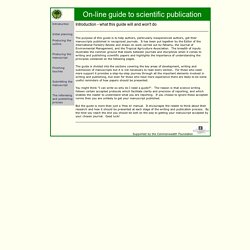
It has been put together by the Editor of the International Forestry Review and draws on work carried out by Fahamu, the Journal of Environmental Management, and the Tropical Agriculture Association. The breadth of inputs illustrates the common ground that exists between journals and disciplines when it comes to writing and publishing scientific papers and highlights the importance of understanding the principles contained on the following pages. The guide is divided into the sections covering the key areas of development, writing and submission of manuscripts but it is not necessary to read every section. You might think "I can write so why do I need a guide? ". The reason is that science writing follows certain accepted protocols which facilitate clarity and precision of reporting, and which enables the reader to understand what you are reporting.
Writing in the Sciences. About the Course This course trains scientists to become more effective, efficient, and confident writers.
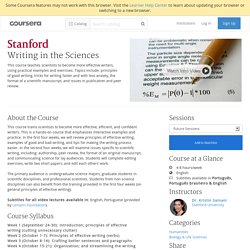
This is a hands-on course that emphasizes interactive examples and practice. In the first four weeks, we will review principles of effective writing, examples of good and bad writing, and tips for making the writing process easier. In the second four weeks, we will examine issues specific to scientific writing, including: authorship, peer review, the format of an original manuscript, and communicating science for lay audiences.
Students will complete editing exercises, write two short papers, and edit each others’ work. The primary audience is undergraduate science majors, graduate students in scientific disciplines, and professional scientists. Subtitles for all video lectures available in: English, Portuguese (provided by Lemann Foundation). Course Syllabus Recommended Background The course has no prerequisites other than fluency in English. Suggested Readings Course Format. Unit 2 of English Communication for Scientists. As a scientist, you are expected to share your research work with others in various forms.
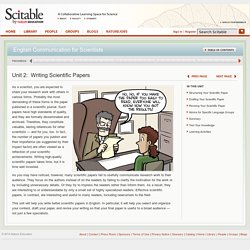
Probably the most demanding of these forms is the paper published in a scientific journal. Such papers have high standards of quality, and they are formally disseminated and archived. Therefore, they constitute valuable, lasting references for other scientists — and for you, too. In fact, the number of papers you publish and their importance (as suggested by their impact factor) are often viewed as a reflection of your scientific achievements. Writing high-quality scientific papers takes time, but it is time well invested. As you may have noticed, however, many scientific papers fail to usefully communicate research work to their audience. This unit will help you write better scientific papers in English. Sci-Writing.pdf. Scientific-writing.pdf. Writing the Scientific Paper. Writing@CSU Guide When you write about scientific topics to specialists in a particular scientific field, we call that scientific writing.
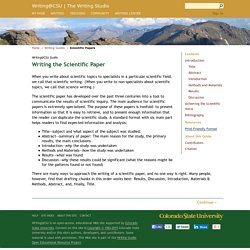
(When you write to non-specialists about scientific topics, we call that science writing.) The scientific paper has developed over the past three centuries into a tool to communicate the results of scientific inquiry. The main audience for scientific papers is extremely specialized. The purpose of these papers is twofold: to present information so that it is easy to retrieve, and to present enough information that the reader can duplicate the scientific study. Title--subject and what aspect of the subject was studied. Writing for science. For a printer-friendly PDF version of this guide, click here This study guide offers you some strategies for making your scientific writing more effective, helping you to write with accuracy and clarity.
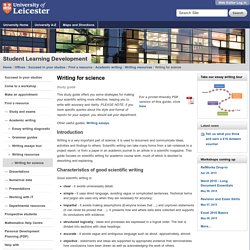
PLEASE NOTE: if you have specific queries about the style and format of reports for your subject, you should ask your department. Other useful guides: Writing essays. Introduction Writing is a very important part of science; it is used to document and communicate ideas, activities and findings to others. English Communication for Scientists. This unit will help you select and organize a paper's content, draft it more effectively, and revise it efficiently.
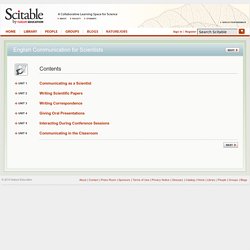
Among others, it offers advice on using verbs optimally, provides general rules for text mechanics (abbreviations, capitalization, hyphens, and so on), and points out frequent shortcomings for speakers of specific language groups.